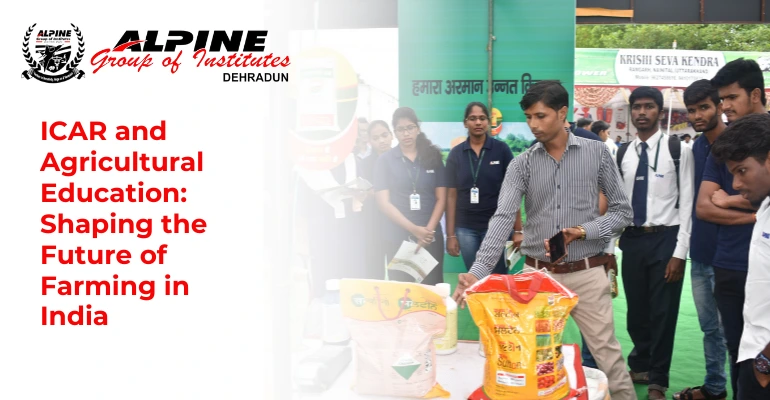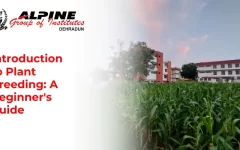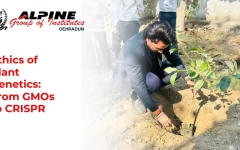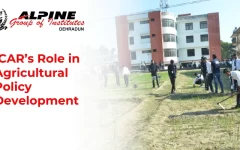ICAR and Agricultural Education: Shaping the Future of Farming in India
2024-12-16 9:36ICAR and Agricultural Education: Shaping the Future of Farming in India
The Indian Council of Agricultural Research (ICAR) has been at the forefront of transforming agricultural education in India. By establishing a robust framework for research, training, and extension services, ICAR plays a pivotal role in preparing the next generation of agricultural professionals. The organization not only develops and promotes cutting-edge research in agriculture but also provides extensive support to universities and colleges, ensuring that India’s agricultural sector remains dynamic, innovative, and resilient in the face of global challenges like climate change, population growth, and food security.
ICAR-Approved Colleges: Shaping the Future of Agricultural Education in India
ICAR is responsible for accrediting and maintaining the standard of agricultural education in India. The ICAR Accreditation system ensures that agricultural colleges and universities across the country provide high-quality, industry-relevant education that aligns with global standards. Today, there are more than 60 ICAR-approved agricultural universities and colleges that offer a range of undergraduate, postgraduate, and doctoral programs in agricultural sciences. These institutions have become hubs of innovation, research, and education, helping young minds discover new solutions to old problems.
Why ICAR-Approved Colleges Matter:
- Standardization of Curriculum: ICAR-approved colleges follow a comprehensive and up-to-date curriculum, which is revised regularly to reflect the latest developments in agricultural science and technology.
- Global Recognition: An ICAR-accredited degree holds significant value, as it is recognized both in India and internationally.
- Research-Oriented Education: Students have access to state-of-the-art research facilities and collaborate with leading agricultural scientists.
ICAR’s strong emphasis on research, training, and practical application makes these institutions excellent choices for aspiring agriculturists who want to shape the future of Indian farming.
Exploring the ICAR-National Talent Scholarship: Opportunities for Aspiring Agriculturists
One of ICAR’s flagship initiatives in agricultural education is the ICAR-National Talent Scholarship (ICAR-NTS), which aims to provide financial assistance to deserving students who wish to pursue undergraduate studies in agricultural sciences. This scholarship program is one of the most prestigious opportunities for students interested in a career in agriculture.
Key Features of the ICAR-National Talent Scholarship:
- Financial Support: The scholarship provides financial assistance to students for their academic fees and other educational expenses.
- Eligibility: The scholarship is open to students who have completed their 10+2 with science subjects (Physics, Chemistry, Biology/Mathematics) and wish to pursue a Bachelor’s degree in agricultural science.
- Opportunities for Growth: Beyond financial aid, ICAR-NTS helps students access research-driven learning environments, facilitating exposure to cutting-edge developments in the agriculture sector.
The scholarship serves as a catalyst for young students, helping them gain access to quality education and ensuring that the country’s agricultural sector is continuously refreshed with new talent and innovative ideas.
How ICAR’s Agricultural Universities Are Preparing the Next Generation of Farmers and Scientists
ICAR’s agricultural universities and colleges play a critical role in nurturing the next generation of agricultural scientists, researchers, and farmers. Through their well-structured academic programs and research initiatives, ICAR institutions are helping students develop the skills needed to tackle contemporary challenges in agriculture.
Preparing for the Future:
- Practical Training: ICAR universities focus on blending theory with hands-on experience. Students gain practical knowledge through internships, fieldwork, and direct engagement with agricultural projects, making them well-equipped to work in the field.
- Research-Focused Curriculum: Agricultural universities supported by ICAR emphasize research as a key element of education. Students engage in projects that explore innovative farming techniques, crop protection, climate-smart agriculture, and more.
- Industry Partnerships: ICAR collaborates with government bodies, international organizations, and the private sector to expose students to real-world issues in agriculture, making them more adaptable and resourceful.
By preparing students through modern teaching methods, field-based learning, and exposure to research and innovation, ICAR’s agricultural universities are building a new generation of farmers and scientists who are ready to revolutionize the Indian agricultural landscape.
The Role of ICAR in Promoting Agricultural Research Careers in India
India’s agricultural sector faces several pressing challenges, including climate change, water scarcity, and the need for higher food production. To address these challenges, ICAR has been instrumental in promoting agricultural research careers in India, attracting talented individuals into the field of agricultural sciences and research.
How ICAR Supports Agricultural Research Careers:
- Research Fellowships: ICAR offers various fellowships to support the education and research of agricultural scientists. These include fellowships for M.Sc., Ph.D. students, and young researchers.
- Innovation and Patents: ICAR encourages young scientists to develop innovative solutions to agricultural challenges. Many of ICAR’s research programs lead to the creation of new technologies, patents, and systems that can significantly enhance agricultural productivity.
- Collaborative Research Opportunities: ICAR’s collaboration with national and international research bodies provides valuable opportunities for young researchers to engage in cutting-edge studies.
ICAR’s investment in agricultural research and development ensures that the country continues to foster talent that is capable of creating solutions to food security challenges and contributing to sustainable farming practices.
ICAR’s Extension Programs: Bridging the Gap Between Research and Rural Farmers
One of ICAR’s most vital functions is its extension programs, which bridge the gap between agricultural research and its practical application in rural farming communities. These programs are designed to transfer the latest agricultural knowledge, technologies, and best practices from research labs and academic institutions to farmers in the field.
Key Extension Programs of ICAR:
- Krishi Vigyan Kendras (KVKs): KVKs are the backbone of ICAR’s extension services. They provide training and education to farmers, promote new farming techniques, and facilitate technology dissemination at the grassroots level.
- Farmer Field Schools: ICAR organizes training sessions for farmers in real-time settings to educate them on innovative farming methods, pest management, water conservation techniques, and crop diversification.
- Capacity Building Workshops: ICAR regularly conducts workshops to upgrade the knowledge and skills of rural farmers, empowering them to adopt new technologies and improve their agricultural practices.
Through these programs, ICAR ensures that its research and innovations are directly benefiting farmers, enhancing their productivity, and improving livelihoods in rural areas. These programs are critical to ensuring that agricultural advancements reach the farmers who need them most, bridging the divide between cutting-edge research and traditional farming practices.
Conclusion
ICAR’s commitment to agricultural education has been transformative, not only in equipping students with the knowledge and skills they need to succeed in agriculture but also in driving the sector forward through research, innovation, and outreach. From offering scholarships and supporting agricultural universities to providing critical extension services, ICAR is laying the foundation for a future where India’s agricultural sector remains robust, resilient, and capable of meeting the growing demands of a global population.
By investing in the education and development of future agricultural scientists, researchers, and farmers, ICAR is ensuring that India’s agricultural sector will continue to thrive in the face of emerging challenges. As the need for sustainable, climate-smart farming grows, ICAR’s efforts to shape the next generation of agricultural professionals will be more important than ever.









